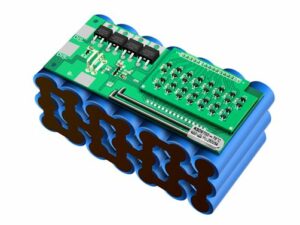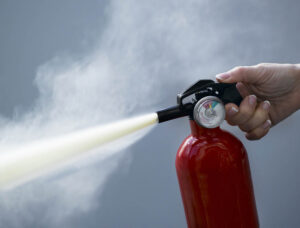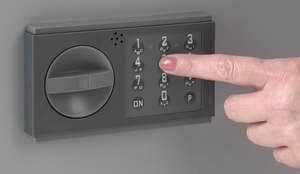Buying Guide: Security Safe
A burglary takes place every 106 seconds in the UK ! Most of us don't expect to fall victim to a burglary. Yet there are 817 domestic burglaries in the UK every day! Do not wait until it is too late, but take timely measures to protect your valuables. Even good insurance is no substitute for your cash, jewellery, sensitive documents, computer media or other valuable assets.
A safe is a worthwhile investment and offers you peace of mind and security

Due to increasing supply and demand, the range of safes for private homes has become very affordable. With the growing number of break-ins, a safe is an ideal place to store cash, important documents, such as marriage certificates, passports and credit cards.
But also for every company, a safe remains an indispensable place to safely store cash and crucial business information and to protect it against the burglars' guild.
How do I make the right choice for a safe?
Many different safes are available to protect money and valuables from theft. To further help you make the right choice, there are the following basic questions:
1: What is the total value of cash and valuables in the safe you wish to store?
2: How large should the safe be, or in other words, what is the required storage capacity?
3: Which type of lock do you prefer?
4: What is your budget?
5: Other important things when choosing a safe
1. Total value - storage of a safe
All safes that are resistant to burglary are equipped with an (indication) valuables storage. The value storage indicates how safe a safe is. The higher the value storage, the safer the safe. Please note: valuation is only applicable if the safe is properly anchored in accordance with the manufacturer's instructions.
How is the value storage measured?
 The value storage, also known as insured value, is a measure for distinguishing the burglary-resistance of different safes. It also applies if you want to have the contents of the safe insured. The higher the value storage, the higher the resistance to breaking open, and thus the better the safe. If you want to insure the contents of your safe, it is advisable to contact your insurance company and be informed of the requirements and conditions that your insurer provides for cover.
The value storage, also known as insured value, is a measure for distinguishing the burglary-resistance of different safes. It also applies if you want to have the contents of the safe insured. The higher the value storage, the higher the resistance to breaking open, and thus the better the safe. If you want to insure the contents of your safe, it is advisable to contact your insurance company and be informed of the requirements and conditions that your insurer provides for cover.
In a safe with a value credit of £10,000, you can store up to £10,000 in cash value . It is therefore not wise to store a cash amount of £50,000 in a safe with a value deposit of £10,000.
Information card for safes Standardization and Coverage advice
As of 1 June 2015, a distinction is also made between value storage for cash and valuables .
If you want to store valuables such as jewellery, a stamp collection, old coins in a safe, the value storage will be doubled. This may partly influence the location of the house or the building, region, the presence of an alarm system, etc.
The valuation is also indicative of the construction of the safe, thickness of the walls and door, complexity and safety of the locking mechanism, lock, additional protections and general build quality. In general, the higher the value storage, the safer the safe.
It is always advisable to contact your insurance company if you want to store specific valuables with high value or a lot of cash.
Security tests & standards
For burglar-resistant safes, a distinction is made between the following security standards:
- EN 14450 European Standard for private safes Security Level S1 and S2 *
- EN 1143-1 European Standard for safes Grade 0 to class VI *
- EN 1143-2 European Standard for Deposit Safes Grade DI to Class DIV *
For more information about standards and burglary resistance go to: What is a security safe .
Table of standards and valuation
| Standardization | Value Storage - European EN Standards | Application | ||
| EN 14450 | Cash | Valuables | ||
| Class S1 | £ 2,000 | £ 20,000 | private and small business use | |
| Class S2 | £ 4,000 | £ 40,000 | private and small business use | |
| EN 1143-1 | EN 1143-2 | |||
| Class 0 | - | £ 6,000 | £ 60,000 | private and small business use |
| Class 1 | Class D1 | £ 10,000 | £ 100,000 | private and small business use |
| Class 2 | Class D2 | £ 17,500 | £ 175,000 | Business use |
| Class 3 | Class D3 | £ 35,000 | £ 350,000 | Business use |
| Class 4 | Class D4 | £ 60,000 | £ 600,000 | Business use |
| Class 5 | - | £ 100,000 | £ 1,000,000 | Business use |
| Class 6 | - | £ 150,000 | £ 1,500,000 | Business use |
- For EN 1143-1 and EN 1143-2: 'Class' is also referred to as 'Grade', 'CEN' or 'Eurograde'.
- For EN 14450: 'Security Level' is also referred to as 'Class'.
- The NCP and VDMA standard has become obsolete and has been replaced by European Standard EN 14450. However, this indication is still frequently used to indicate the safety of a safe. Please note: these are safes built according to regulations. These have not been tested and are not certified! This designation will fully expire on 1 January 2016.
2. Storage capacity, contents of the safe
The size of the safe must of course depend on what you want to store in it. If you wish to place files in the safe, you must take into account a height (file folder in portrait orientation) or width (file folder in landscape format) of 32 cm and a depth of 29 cm. A safe is a sustainable investment so make sure that not only do things fit in now, but provide extra space for later.

Tip
- The purchase of a safe is a sustainable investment; never buy a safe too small, but focused on the future.
- Note the free passage of a safe. Due to the door construction, the free passage can be smaller than the net internal width. As a result, a file, laptop, or other stuff just can't fit!
3. Safe lock type, which one is best?

A wide variety of locks are available for safes. You can choose from key locks, mechanical combination locks, electronic code locks or biometric locks. There are also time locks and safes can be equipped with double locks so that 2 people are needed to open the safe. The various lock options have advantages and disadvantages.
Read our extensive blog article which type of safe lock is best for you, or contact us for personal advice.
4. Budget, amount of your investment
In principle, there is a safe for every budget. In general; the higher the investment; the better the protection against burglary or fire. Is burglary and fire safety combined in a safe? The required budget will increase, but at the same time you will be better protected.
Budget is an important factor in every situation. However, determine your choice for the right safe based on your requirements and wishes. If this is above your budget, consider a smaller model or switch to a key lock. You maintain a lower investment while maintaining safety.
5. Other important matters when choosing a burglar-resistant safe
Type and version; a specific safe for each application
Safes come in many different types and designs. This has to do with the type of items that can be stored in the safe and additional provisions that have been made in the safe.
- Home safe - for storing limited amount of cash and valuables. Private and small business use.
- Certified Safe or Money Safe - for storing larger amounts of cash and valuables. Business use.
- Safes for computer and laptops - for storing laptops, computers, servers, etc.
- Key safe or Key cabinets - for the safe storage of several or hundreds of keys.
- Deposit safe - for skimming day money for hotels, restaurants, shops, etc.
- Wall safe - walled in a stone or concrete wall.
- Hotel safe - for hotel guests and management functions.
- Floor safe - walled in to a floor below ground level.
- Car key safe - for storage of car key sets.
- Gun safe - for safe storage of firearms.
Interior options
There are several options when it comes to the interior of your safe. It is possible to provide a safe with lockable compartments, so that there is only access to documents, not cash. Extendable suspension file frames, extra shelves, or special data inserts for extra fire safety of data media.
![]()
Placement and anchoring of safes
 A safe can be installed in several ways. Safes can be placed freestanding, while they can also be attached to floors, walls, or inside a cupboard, under a bed, etc. There are also floor safes, specially designed to be mounted below ground level. All safes up to 1000 kg must be properly anchored. If you want to have a safe installed, go to Placing and Anchoring Safe.
A safe can be installed in several ways. Safes can be placed freestanding, while they can also be attached to floors, walls, or inside a cupboard, under a bed, etc. There are also floor safes, specially designed to be mounted below ground level. All safes up to 1000 kg must be properly anchored. If you want to have a safe installed, go to Placing and Anchoring Safe.
Take into account the maximum permitted weight on the spot and the weight of the safe you have in mind. If you are not sure whether the floor is strong enough, please contact us.




 If a small lithium ion battery such as a smartphone or power bank is on fire, you can try to extinguish it yourself. Make sure that you do not inhale any hazardous substances and think about your own safety. At the time of writing this article, the fire service is still busy researching the best extinguishing method for lithium batteries. Lithium battery extinguishing agents that are most effective now are the following.
If a small lithium ion battery such as a smartphone or power bank is on fire, you can try to extinguish it yourself. Make sure that you do not inhale any hazardous substances and think about your own safety. At the time of writing this article, the fire service is still busy researching the best extinguishing method for lithium batteries. Lithium battery extinguishing agents that are most effective now are the following.





 The Homesafe series is the latest range of
The Homesafe series is the latest range of 



 Ease of use : What is striking is the lack of a door handle. This function has been adopted in the lock, which is equipped with a black rotating ring. After entering the factory code, we were able to open the lock and then the safe. The keystrokes feel good and give feedback by means of a beep and red LED. You will be warned in time if the battery is weak. Changing is easy because the battery is in the keyboard. A battery is included as standard. Nice feature is the lighting; in the dark you press the light and the keyboard is illuminated.
Ease of use : What is striking is the lack of a door handle. This function has been adopted in the lock, which is equipped with a black rotating ring. After entering the factory code, we were able to open the lock and then the safe. The keystrokes feel good and give feedback by means of a beep and red LED. You will be warned in time if the battery is weak. Changing is easy because the battery is in the keyboard. A battery is included as standard. Nice feature is the lighting; in the dark you press the light and the keyboard is illuminated.
 Lips Safes and Chubbsafes
Lips Safes and Chubbsafes


 It is important to consider what you want to protect against fire and what risk you run or don't want to run.
It is important to consider what you want to protect against fire and what risk you run or don't want to run.
 A wide variety of locks are available for safes. You can choose from key locks, mechanical combination locks, electronic code locks or biometric locks. There are also time locks and safes can be equipped with double locks so that 2 people are needed to open the safe. The various lock options have advantages and disadvantages.
A wide variety of locks are available for safes. You can choose from key locks, mechanical combination locks, electronic code locks or biometric locks. There are also time locks and safes can be equipped with double locks so that 2 people are needed to open the safe. The various lock options have advantages and disadvantages.
Add a comment